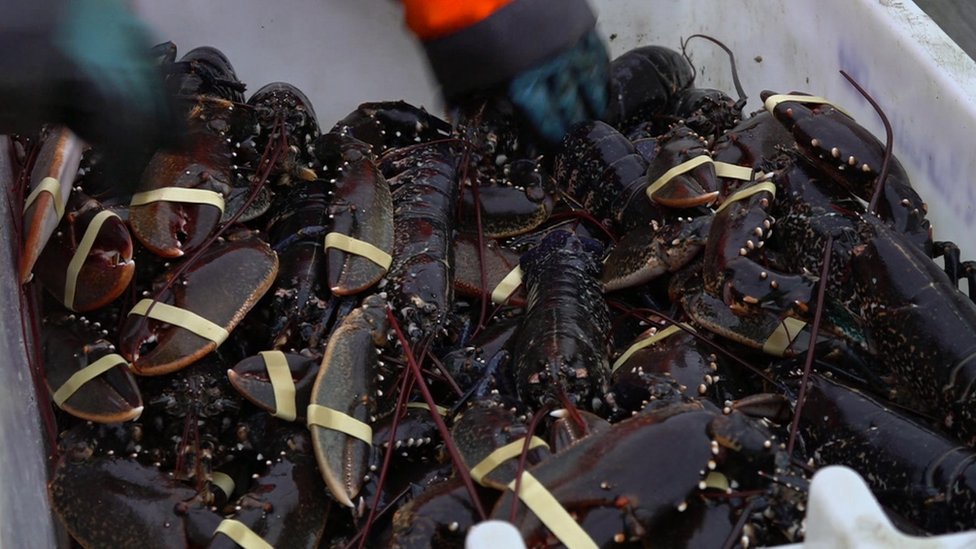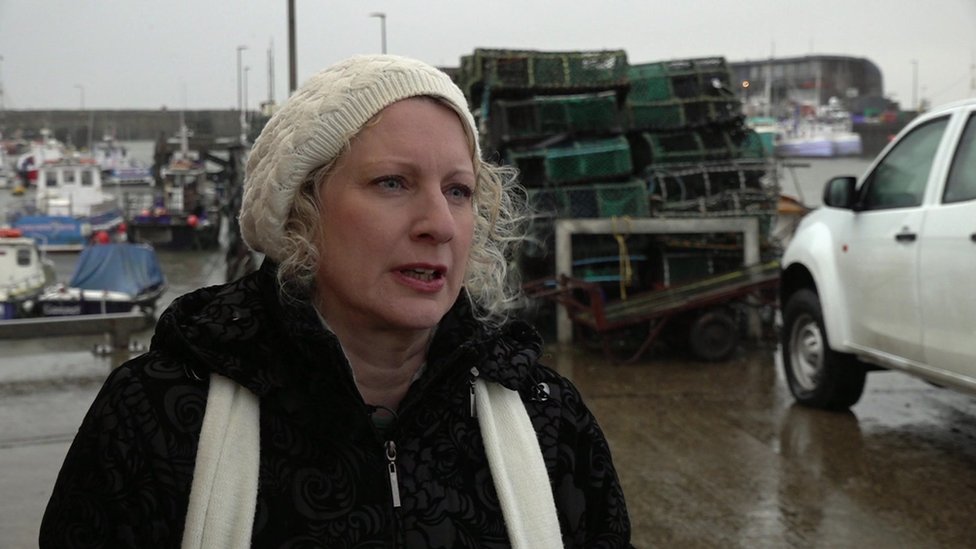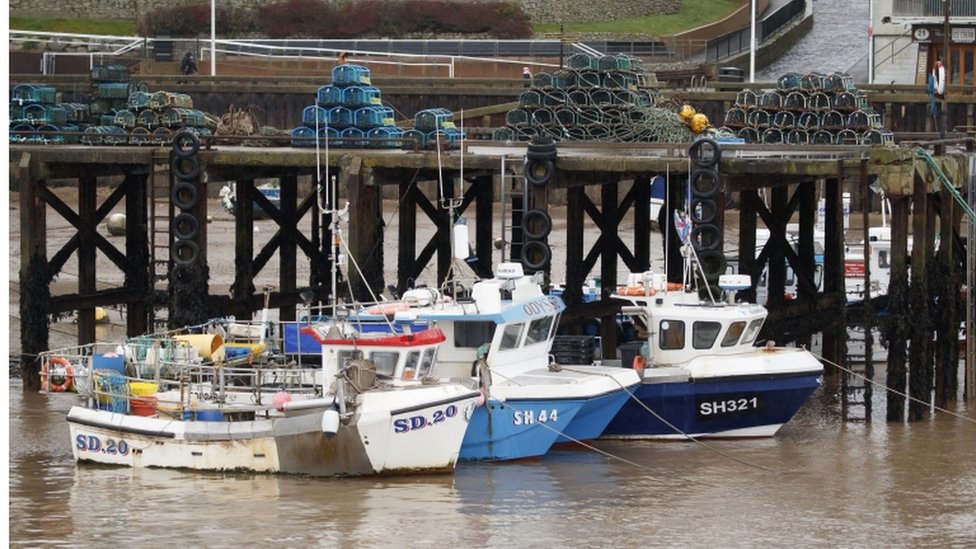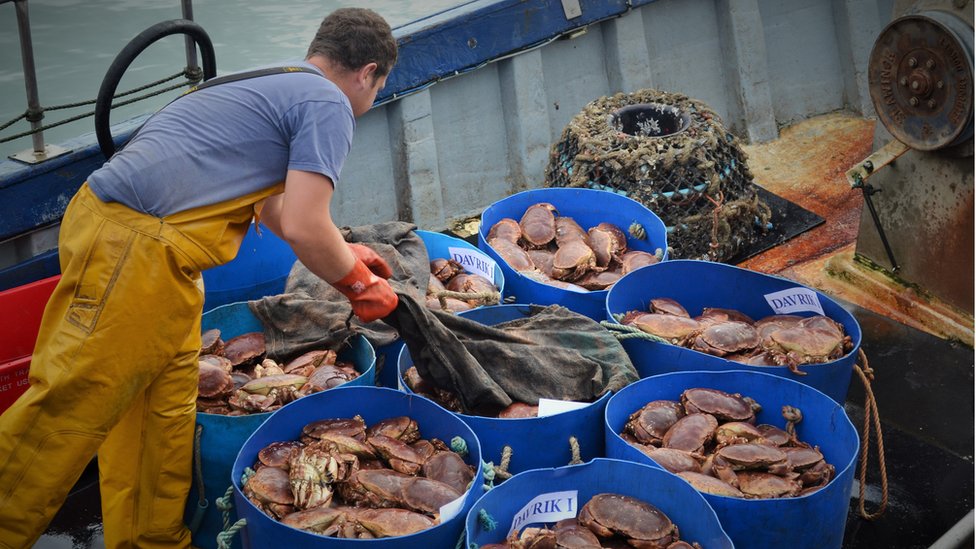Shell shocked: ‘Lobster capital’ braces for Brexit

Live shellfish exporters in England have warned a wave of form-filling, certification and tariffs will hit the industry in 2021.
Traders who sell live crabs and lobsters into the EU expect delays caused by bottlenecks and new rules.
Fisheries remains a problem for post-Brexit trade talks, but even if a deal is done, trading across the Channel will not be as seamless as it is now.
More than 80% of crabs and lobsters from East Yorkshire are sold in Europe.
On a typically blustery morning on Bridlington Harbour the lobster lorry arrives from France.
It makes stops all along the East Yorkshire coast, loading freshly caught lobsters into sea water tanks to transport and sell back on the continent.
Exporting live shellfish to France and Spain will become much more challenging when the UK enters into a new relationship with the European Union from 1st January 2021.
Lobster to get more luxurious?
Hundreds of shell fisherman and exporters rely on frictionless trade, so a no deal is their worst-case scenario.
“The cost of everything will rise with all the extra tariffs businesses will have to pay on goods going in both directions,” according to Jo Ackers, the company secretary of one of the largest shellfish wholesalers in Bridlington.
“We are looking at extra tariffs of 8% on lobster and 7.5% on crab with EU countries having similar import tariffs. It is the fishermen and the end of line customers that would get hit with these costs in the long term,” she said.
Ms Ackers runs the Independent Shellfish Cooperative alongside her husband in Bridlington.
The pair act on behalf of 31 vessels, selling their fresh catch of lobsters, crab and whelks for both processing and the live market.

Much of it driven by lorry from harbours in Yorkshire to southern ports like Dover or Plymouth and then onwards to markets on the Mediterranean.
Shellfish receives the highest prices when shipped live to the EU, and so any delays and congestion at the ports will likely hit profits.
Ms Ackers is not only worried about tariffs being slapped on exports, but higher taxes coming the other way too.
Costs rising
She fears the cost of the material the fishermen need to do their work with rise too.
“A lot of rope and twine is made in Portugal, the most popular clothing manufacturer is French and the most popular wellies are made in the Netherlands. The fishermen are therefore faced with the prospect of increasing prices on the goods they buy while the value of their catch is decreasing,” she says.
From Flamborough Head to Spurn Point, the East Yorkshire coast is home to the UK’s largest crab and lobster fishing industry, landing almost £10m worth of shellfish every year.
This is an economic success story in an area that has often struggled. Many working the shellfish boats are veterans of the 1970’s cod wars which finished off the UK trawler fleet.

PA Media
New rules, new forms
Any deal brokered by government is only part of the challenge here. Ms Ackers says in the New Year there will be a bureaucratic mountain to climb.
“I think it’s getting more confusing and complicated the closer we get, it’s almost information overload, everybody is trying to tell us what we should be doing, and it quite difficult to sift through it all,’ said Ms Ackers.
Some of the
new requirements for live shellfish exports from 1st January 2021 include an export animal health certificate that must be signed by a fish health inspector who will need at least five working days notice.
It’s an official document that confirms your export meets the health requirements of the country it’s destined for.
The importer must then notify an EU Border Control Point. Shellfish must be then checked at a Border control point and UK Customs forms should also be completed.
40-year-old accord gone
With just two weeks until this new system begins, frustration is building 300 miles south in Devon amongst the south west fishing fleet.

Beshlie Pool, the Executive Officer of South Devon and Channel Shellfishermen’s Association, warns the logistical challenges ahead are ‘very significant and concerning.’
The association has 75 shellfish boats that land around £5m worth of crab and lobsters at the ports of Salcombe and Dartmouth every year, and like Bridlington, much of it is exported.
“Our exporting members remain extremely distressed about difficulty with logistics related to the exports from January 1st onwards including issues with the design of government systems and processes, availability of staff needed to sign off exports and a massive increase in paperwork burdens with significant associated costs,” said Ms Pool.
Fishing has always been an emotional issue in the UK’s relationship with the European Union, and is at the centre of ongoing negotiations regarding a future trade deal.
“Parts of our South West fishing fleet are facing the breakdown of a 40-year-old accord with our French and Belgian colleagues, and the associated loss of fishing grounds and therefore revenue,” said Ms Pool.

‘Unworkable’
Exporters says they are working through exceptionally difficult times. Mark Moore, from the Dartmouth Crab Company, warned that ‘lack of clarity from Government is impacting our day to day business, as we try to prepare to export in the new year.’
The company has a fleet of nine lorries and exports live crabs to France and Portugal. Over the decades the shellfish industry has relied on a smooth supply chain delivering seafood from catch to plate within 24 hours.
Mr Moore is worried about the news rules and regulation could slow things down, which is a major concern when dealing live products.
“The catch certification requirements remain unworkable, the issuing of European Health Certificates is still in a state of confusion and we are significantly concerned about the additional costs related to these, there is no real guidance available on how tariffs will operate.
“Frankly, it’s a mess”.
Published at Fri, 18 Dec 2020 22:02:11 +0000





Comments
Loading…